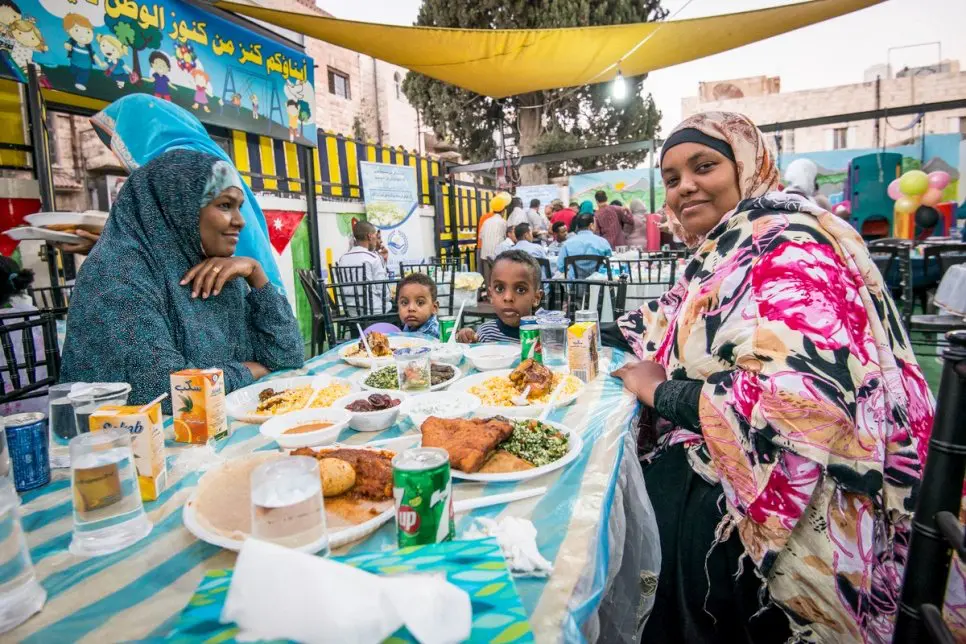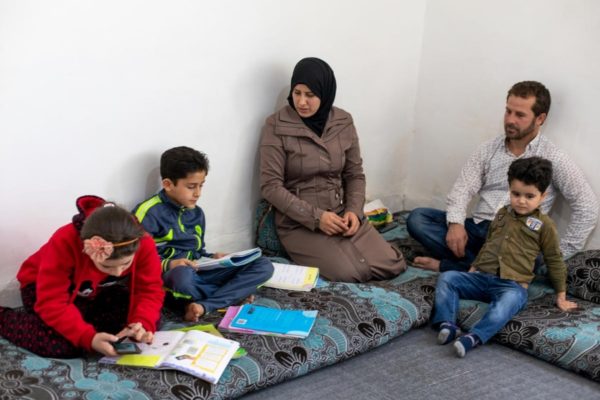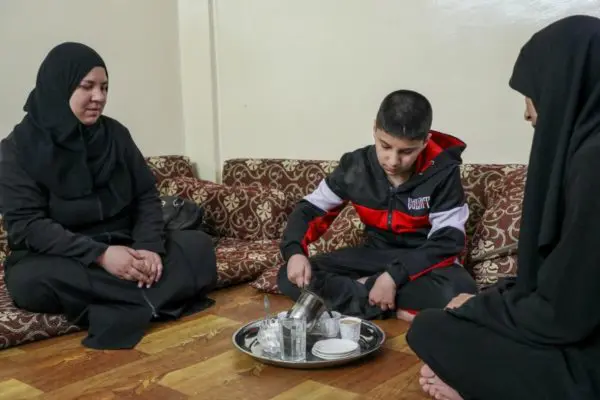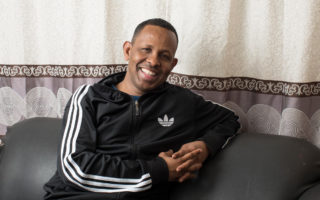
Somali refugees break the Ramadan fast at the Al Amal Orphan Society in Amman, Jordan. © UNHCR/Benoit Almeras
As the Islamic world prepares to welcome the holy month of Ramadan, UNHCR, the UN Refugee Agency, urges greater support for millions of refugees and internally displaced people hit hardest by the COVID-19 pandemic.
People forced to flee their homes must be included on an equal footing in global vaccination programmes and economic recovery plans. Greater efforts are also needed to address their educational needs, mental health and psychosocial welfare, child protection risks, and in preventing and responding to gender-based violence.
“At this time of deep reflection and generosity, our solidarity with the world’s forcibly displaced is needed more than ever,” said Filippo Grandi, the UN High Commissioner for Refugees. “In the spirit of solidarity during the Holy Month, I’m appealing for greater support for vulnerable people.”
Around 85 per cent of the world’s refugees are hosted in low- and middle- income countries that are facing financial challenges and often have fragile health systems. As a result of the pandemic, refugees and the displaced have lost livelihoods and been thrust into extreme poverty, with disastrous and far-reaching consequences.
UNHCR estimates that three in four refugees worldwide can only meet half or less of their basic needs. Families have cut spending on food, are no longer able to pay rent, have fallen deeper into debt, or have been forced to stop children from attending lessons, even where schools have remained open.
Coinciding with the holy month of Ramadan, UNHCR has launched the “Every Second Counts” global fundraising campaign. Donations received as Zakat, Sadaqah, or general giving can ease the burden for forcibly displaced families that are away from home and their loved ones.
“Together we can help refugees and the internally displaced have a roof over their heads, a warm meal for iftar, clean water, and hope for a better and safer future,” said Grandi.
Financial support is urgently needed for UNHCR to continue providing life-saving assistance and support to vulnerable families, orphans, single mothers, and older people.
The campaign will also provide funds for UNHCR’s regular programming and help meet the mounting needs caused by the COVID-19 pandemic.
For more information, please contact:
- In Amman, Rula Amin, aminr@unhcr.org, +962 790 04 58 49
- In Amman, Andreas Kirchhof, kirchhof@unhcr.org, +962 791 825 473
- In the UAE, Raefah Makki, makkir@unhcr.org, +971 508 13 0594
B-roll available:
- Syria: https://media.unhcr.org/Package/2CZ7A294RIU#/DamView&VBID=2CZ94SGTHAGV&PN=1&WS=SearchResults
- Yemen: https://media.unhcr.org/Package/2CZ7A294RIU#/DamView&VBID=2CZ94SGTHHEE&PN=1&WS=SearchResults
- Bangladesh: https://media.unhcr.org/Package/2CZ7A294RIU#/DamView&VBID=2CZ94SGTH82Y&PN=1&WS=SearchResults
- Campaign video: https://youtu.be/3rPn-cihRbU
About UNHCR
UNHCR, the UN Refugee Agency, leads international action to protect people forced to flee their homes because of conflict and persecution. We deliver life-saving assistance like shelter, food and water, help safeguard fundamental human rights, and develop solutions that ensure people have a safe place to call home where they can build a better future. We also work to ensure that stateless people are granted a nationality.
About the Ramadan Campaign
Every year, UNHCR appeals to the public during the month of giving and generosity to help raise awareness and funds for refugees and internally displaced people in need. ‘Every Second Counts’ is UNHCR’s third global Ramadan campaign, and focuses on the incredible impact individuals can create within seconds, in the lives of refugee and displaced families whose lives turned upside down within moments and who have been forced to flee their homes in search of safety. The campaign aims to raise US$10 million globally, through donations including Zakat and Sadaqah, to help provide lifesaving support such as shelter, food, clean water and monthly cash assistance, to the most vulnerable refugee and internally displaced families from Syria, Iraq, Yemen, Afghanistan, Nigeria, countries in the Sahel region, and Rohingya refugees in Bangladesh.
You can donate here.
Originally published by UNHCR on 12 April 2021.





